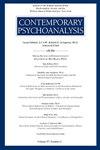Psychoanalysis and Reproductive Justice: Reflections on Dobbs and the Possibilities of Psychoanalytic Political Praxis
IF 0.2
4区 心理学
Q4 PSYCHIATRY
引用次数: 1
Abstract
Abstract This essay addresses the aftermath of Dobbs, the Supreme Court Decision that overturned Roe v. Wade, by looking to what can be learned from other countries, specifically psychoanalytically-informed praxis. Focusing on the role of psychoanalysts in particular, and psychoanalysis, more generally, in Argentina, I make the case for a psychoanalytic political praxis. This engages a Black feminist commitment to reproductive justice, a more expansive frame for politics that can embrace intersectional aims across a range of policy issues connected to the human right to have or to not have children, in a social and political context that supports the common good and facilitates human and environmental flourishing. In doing so, I highlight psychoanalysis’s somewhat hidden history of political commitment and engagement, particularly in terms of the interpersonal approach. I argue that only a sustained commitment from progressive forces, including among those in psychoanalysis, can forestall the further encroachment of authoritarian, anti-democratic forces operating in the US.心理分析与生殖正义:对多布斯和心理分析政治实践可能性的思考
本文章由计算机程序翻译,如有差异,请以英文原文为准。
求助全文
约1分钟内获得全文
求助全文

 求助内容:
求助内容: 应助结果提醒方式:
应助结果提醒方式:


